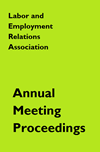The Elusive Union Safety Effect: Toward a New Empirical Research Agenda
Abstract
Although unions engage in numerous activities designed to promote workers’ safety and health, surprisingly few social scientific studies have confirmed the existence of a “union safety effect.” Much extant literature, I argue, is fraught with empirical biases that may mask unions’ true impact. I suggest several possible solutions. First, researchers should devote more effort to understanding the empirical biases that confound empirical analysis. Second, when comparing union and nonunion firms, researchers should try to compare groups that are relatively homogenous and obtain as much information as possible about the study subjects. Finally, when implementing new safety- or health-related programs, unions should bring credibly impartial social scientists in on the ground floor to assist with programmatic design, testing, and long-term evaluation. Greater use of such techniques will help unions target their resources more effectively, improve organized labor’s competitive advantage, and convince skeptics of unions’ unique and important role in protecting American workers.Downloads
Issue
Section
2009 San Francisco, CA Proceedings

